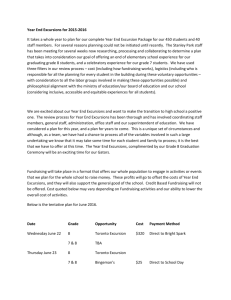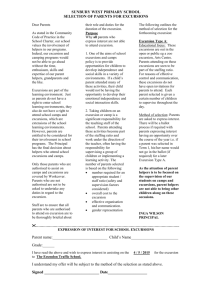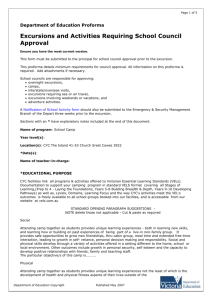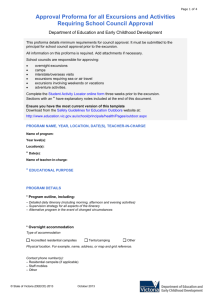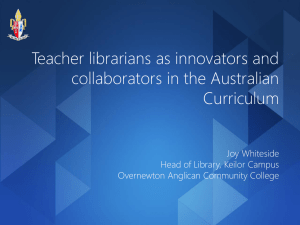Advice for Parents
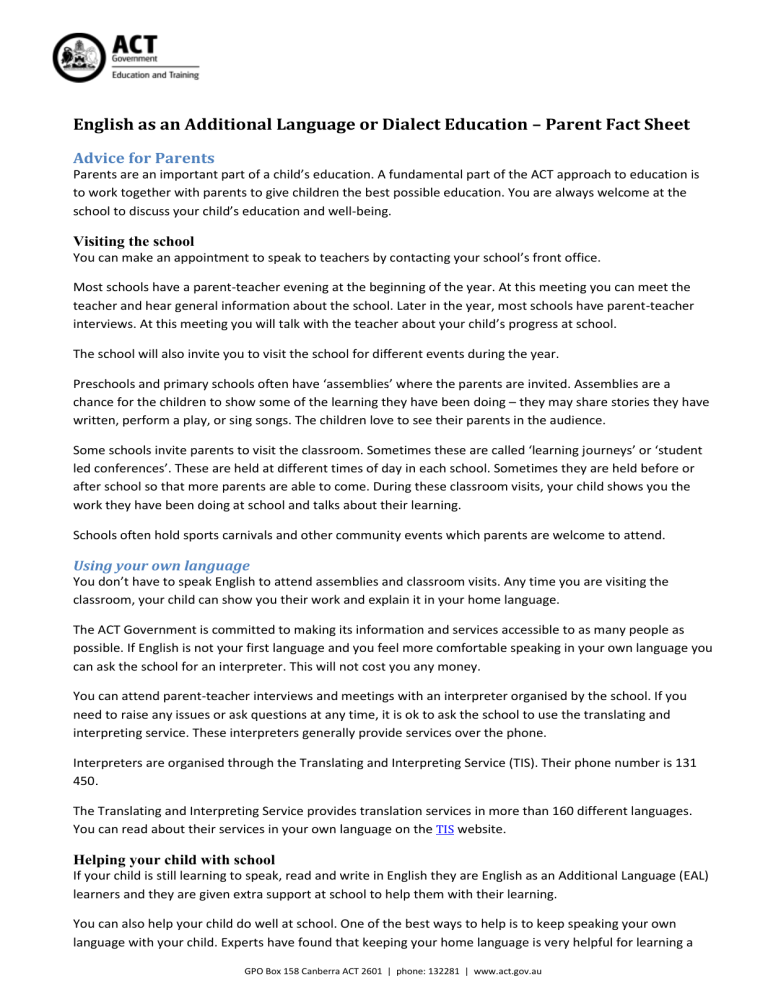
English as an Additional Language or Dialect Education – Parent Fact Sheet
Advice for Parents
Parents are an important part of a child’s education. A fundamental part of the ACT approach to education is to work together with parents to give children the best possible education. You are always welcome at the school to discuss your child’s education and well-being.
Visiting the school
You can make an appointment to speak to teachers by contacting your school’s front office.
Most schools have a parent-teacher evening at the beginning of the year. At this meeting you can meet the teacher and hear general information about the school. Later in the year, most schools have parent-teacher interviews. At this meeting you will talk with the teacher about your child’s progress at school.
The school will also invite you to visit the school for different events during the year.
Preschools and primary schools often have ‘assemblies’ where the parents are invited. Assemblies are a chance for the children to show some of the learning they have been doing – they may share stories they have written, perform a play, or sing songs. The children love to see their parents in the audience.
Some schools invite parents to visit the classroom. Sometimes these are called ‘learning journeys’ or ‘student led conferences’. These are held at different times of day in each school. Sometimes they are held before or after school so that more parents are able to come. During these classroom visits, your child shows you the work they have been doing at school and talks about their learning.
Schools often hold sports carnivals and other community events which parents are welcome to attend.
Using your own language
You don’t have to speak English to attend assemblies and classroom visits. Any time you are visiting the classroom, your child can show you their work and explain it in your home language.
The ACT Government is committed to making its information and services accessible to as many people as possible. If English is not your first language and you feel more comfortable speaking in your own language you can ask the school for an interpreter. This will not cost you any money.
You can attend parent-teacher interviews and meetings with an interpreter organised by the school. If you need to raise any issues or ask questions at any time, it is ok to ask the school to use the translating and interpreting service. These interpreters generally provide services over the phone.
Interpreters are organised through the Translating and Interpreting Service (TIS). Their phone number is 131
450 .
The Translating and Interpreting Service provides translation services in more than 160 different languages.
You can read about their services in your own language on the TIS website.
Helping your child with school
If your child is still learning to speak, read and write in English they are English as an Additional Language (EAL) learners and they are given extra support at school to help them with their learning.
You can also help your child do well at school. One of the best ways to help is to keep speaking your own language with your child. Experts have found that keeping your home language is very helpful for learning a
GPO Box 158 Canberra ACT 2601 | phone: 132281 | www.act.gov.au
new language. Learning to read and write in your home language will also help your child learn to read and write in English. Having material like books, newspapers, videos and TV shows available in your home language will help to develop your home language. The children use their skills from their home language to help them learn English. Using your home language also keeps your own relationship with your child strong.
What will my child learn at school?
Not all the learning at school is done through textbooks. Most teachers want children to ‘learn by doing’, so there are usually lots of activities in the classroom.
All students in Australian schools learn the content of the Australian Curriculum. The current subjects in the
Australian Curriculum are:
English
Mathematics
Humanities and Social Sciences
Science
The Arts
Health and Physical Education
Technologies
Languages
The content of the Australian Curriculum is available online for everyone to read.
http://www.australiancurriculum.edu.au
Will my child have homework?
Each school has its own homework policy. Talk to your child’s teacher to find out their expectations for homework. If your child cannot understand their homework you should talk to the classroom teacher about it.
Some schools have homework assistance programs where children can get extra help with homework.
Reading books at home for fun and enjoyment is a very good way to support learning at school. You can read to your children, or with your children, or they can read by themselves. They can also listen to other people reading books on audio books. Books can be borrowed for free from the school library or the local public library.
Why are there so many excursions?
Excursions (visits to places outside of school) and school camps are very common in Australian schools. They are important for student learning. The children learn a lot of new information that they can use for their classroom work at school. They are also a great opportunity to build positive relationships with class mates and school staff. Supporting your child’s participation in excursions and camps will benefit your child both socially and academically. School excursions usually happen during school time. School camps usually happen overnight. Teachers are always with the children on excursions and school camps.
You must sign a permission note to allow your child to attend an excursion or school camp. Remember to ask the school to use the interpreting service if you do not feel you understand enough about the excursion or camp.
If the cost of an excursion or camp makes it difficult for your child to participate, speak with school staff. Many schools offer options so your child can still attend the excursion or camp.
GPO Box 158 Canberra ACT 2601 | phone: 132281 | www.act.gov.au
